
The paper that I am proudest of is finally out with open access!🎉 Please spread widely! link.springer.com/article/10.100… 
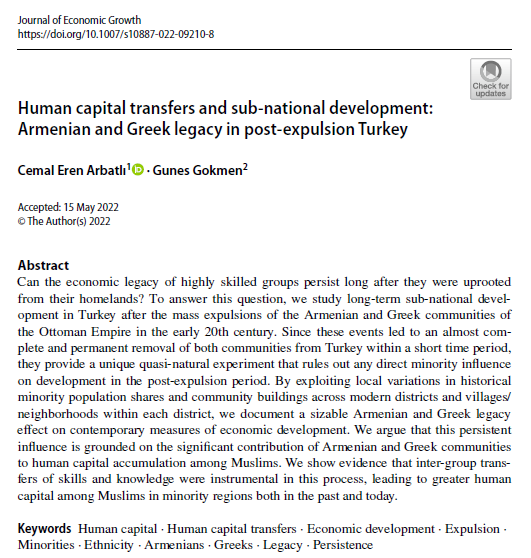
I’d like to thank my (twitterless) co-author and dear friend Güneş Gökmen from @EconomicsLund for this long but fun journey. Thanks to @lunduniversity for the open-access funding. Below is a long 🧵 #EconTwitter
1/One big lesson we have learned from the huge literature on long-term persistence is that history matters for current outcomes more than we initially thought and in ways that are not so trivial.
Our paper is about how demographic history shapes long-term development.
Our paper is about how demographic history shapes long-term development.
2/History abounds with episodes of mass migrations triggered by wars, civil unrest, natural disasters, and state-mandated expulsions or relocations. If current times are any indication, we will continue to witness similar events going forward.
3/Migrants and refugees bring their human capital and culture to their new homes. Many papers have thus studied the historical role displaced ethnic/religious groups played in the economic development of the receiving regions.
4/Our goal in this paper is different:
We assess the historical legacy of these communities in the regions they departed, instead of the areas they moved in.
We assess the historical legacy of these communities in the regions they departed, instead of the areas they moved in.
5/The main challenge is that the “legacy effects” of a community are hard to isolate.
First,there is the problem of selective departure. Oftentimes, only a subgroup of the community ends up emigrating, and these emigrants are usually not representative of the broader community.
First,there is the problem of selective departure. Oftentimes, only a subgroup of the community ends up emigrating, and these emigrants are usually not representative of the broader community.
6/Second, even if the whole community leaves, some of the emigrants (or their descendants) may return later on. Then, we cannot disentangle persistent legacy effects from contemporaneous effects.
7/The two historical episodes we study in this paper help us overcome this challenge:
8/The deportations/mass killings of Armenians of Anatolia during WW1
and
the involuntary exodus of Greeks from Anatolia as a result of the Greco-Turkish War (1919-1922) and the 1923 Population Exchange Agreement between Greece and Turkey.

and
the involuntary exodus of Greeks from Anatolia as a result of the Greco-Turkish War (1919-1922) and the 1923 Population Exchange Agreement between Greece and Turkey.
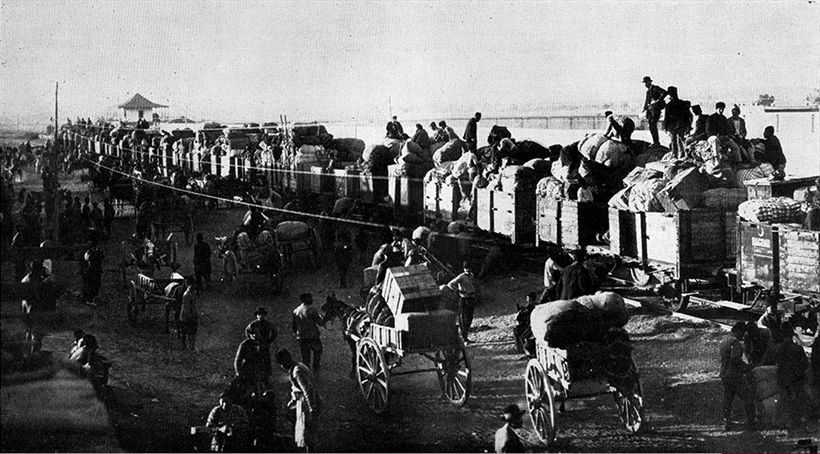
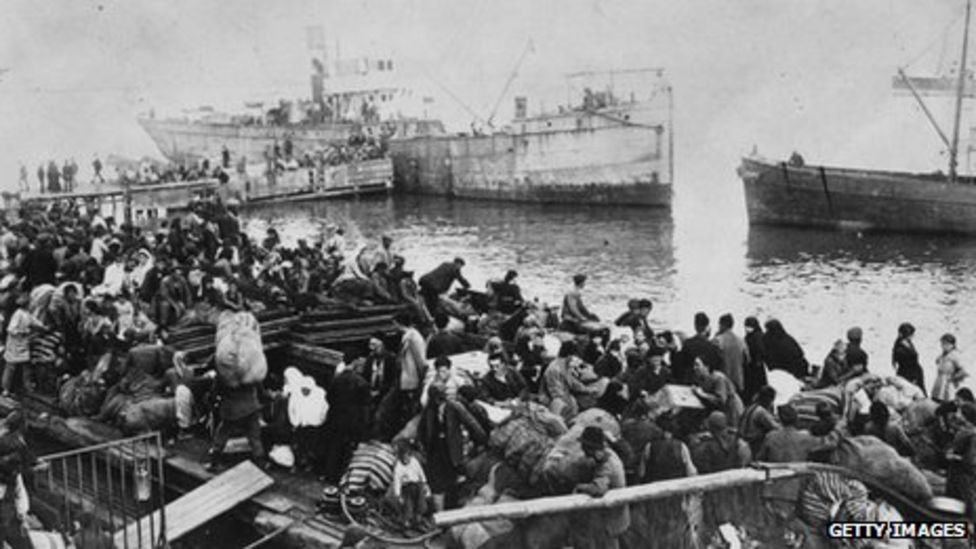
9/ These state-mandated expulsions led to almost complete removal of both communities in a relatively short time period. Since there was no return migration, these tragic events permanently ended the centuries-long co-existence between Muslim and Christian communities.
10/ Armenians and Greeks were among the most ancient Christian communities in Anatolia. On average, they possessed higher levels of human capital than the Muslims of the Ottoman Empire.
11/With the expulsions of Greeks and Armenians, Turkey lost a large fraction of its successful merchants, money lenders, artisans and farmers.
Despite the negative effects on human capital, do we still observe a positive developmental legacy of Armenians and Greeks in Turkey?
Despite the negative effects on human capital, do we still observe a positive developmental legacy of Armenians and Greeks in Turkey?
12/The answer is a resounding YES.
Analyzing cross-sectional variations we find that districts that were home to a greater share of Greeks and Armenians prior to expulsions are today more densely populated, more urbanized, and more developed as reflected in nighttime lights.
Analyzing cross-sectional variations we find that districts that were home to a greater share of Greeks and Armenians prior to expulsions are today more densely populated, more urbanized, and more developed as reflected in nighttime lights.
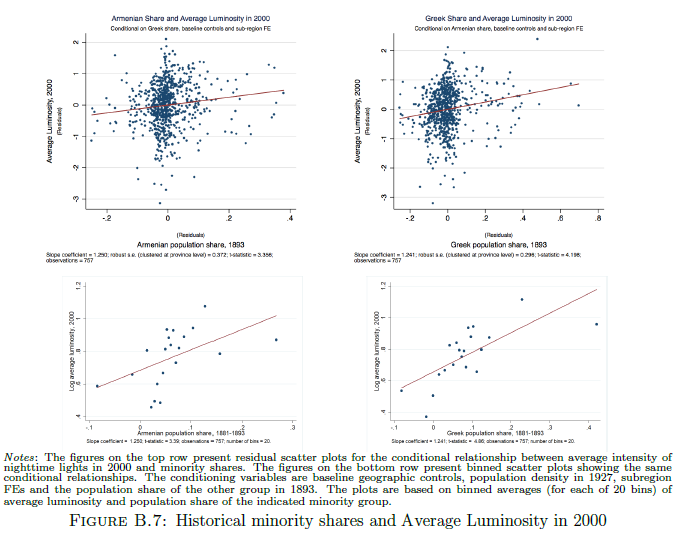
13/While these relationships are robust to a rich set of controls to account for geographic,historical, and contemporary confounders, one can argue that the historical ethno-religious composition of the regions we study might be driven by unobserved factors of economic potential.
14/So we conduct further analyses at a much granular geographic scale:
Analyzing within-district variations across more than 49.000 villages or neighborhoods, we observe that proximity to an old Armenian or Greek community building predicts a higher density of nighttime lights.
Analyzing within-district variations across more than 49.000 villages or neighborhoods, we observe that proximity to an old Armenian or Greek community building predicts a higher density of nighttime lights.
15/What can explain the persistence of minority legacy in the absence of any direct effect of minority human capital?
Is it merely the result of physical capital minorities left behind? Or does it also reflect the historical contribution of minorities to Muslim human capital?
Is it merely the result of physical capital minorities left behind? Or does it also reflect the historical contribution of minorities to Muslim human capital?
16/Our evidence suggests that human capital transfers played a major role:
We first offer anecdotal and descriptive evidence that there was large scope for inter-group economic interactions and human capital spillovers.
We first offer anecdotal and descriptive evidence that there was large scope for inter-group economic interactions and human capital spillovers.
17/Then we show that human capital among Muslims was higher in high-minority regions both before and in the immediate aftermath of the expulsions. 
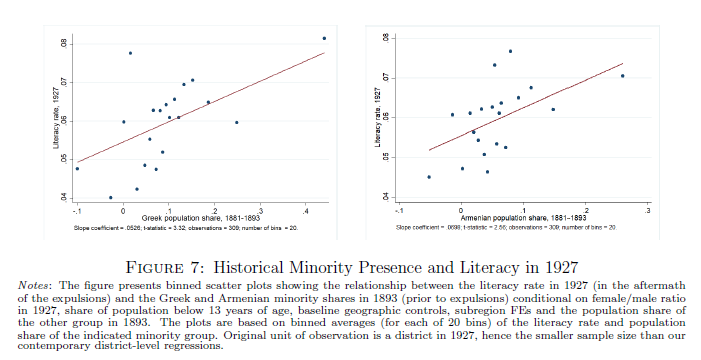
18/Current education levels are higher in ex-minority areas. Moreover, the current occupational structure in ex-minority areas is relatively more skill-intensive and largely accords with historical patterns of Greek and Armenian occupational specialization.
19/ The paper contains many more analyses/insights that I cannot possibly summarize here.
To sum up: the imprint of Armenians and Greeks on their homelands was strong enough to remain visible despite the adverse effects expulsions might have had.
To sum up: the imprint of Armenians and Greeks on their homelands was strong enough to remain visible despite the adverse effects expulsions might have had.
20/One broad lesson from our research is that our understanding of the historical roots of regional development might be incomplete unless we pay more attention to the subtle influence of populations that are long gone.
We are thankful to Quamrul Ashraf, @essobecker, @GalorOded,@andreamatranga,@Arbatli_Ekim,@timurkuran,@JeanetBentzen,@OmerOzakEcon,@DrDaronAcemoglu,@tekguchasan,@ezhuravskaya
@renikolopov,@HornungErik,@selimgulesci,@Natkhov,@SevketPamukNote,@gunesasik,@Zoabi_Hosny,and many more for great comments over the years!
• • •
Missing some Tweet in this thread? You can try to
force a refresh



